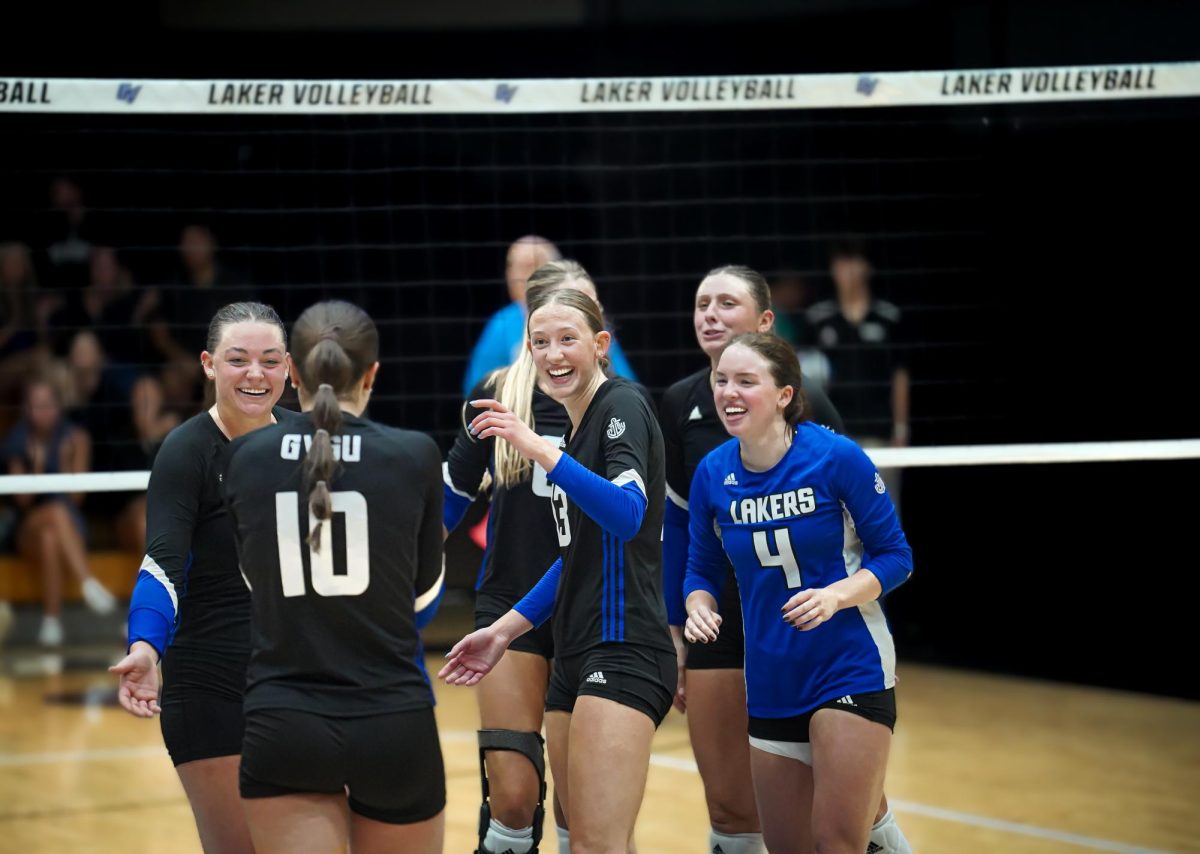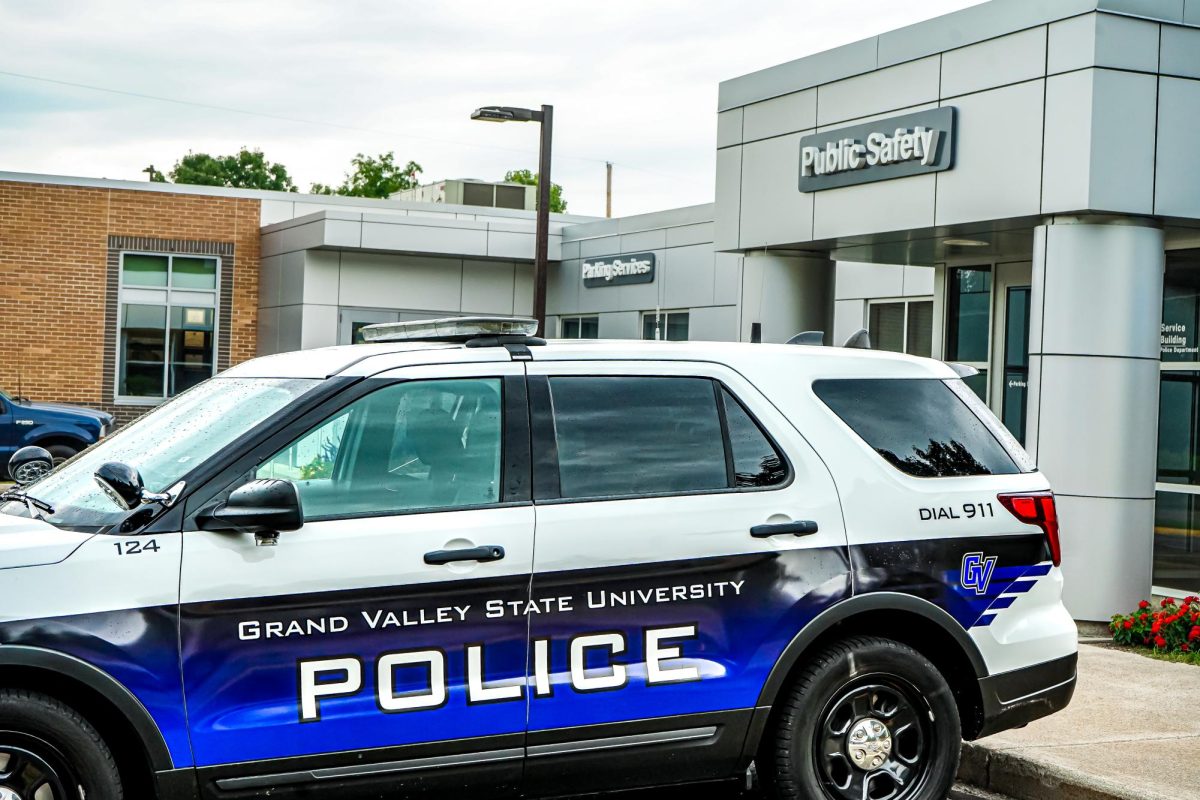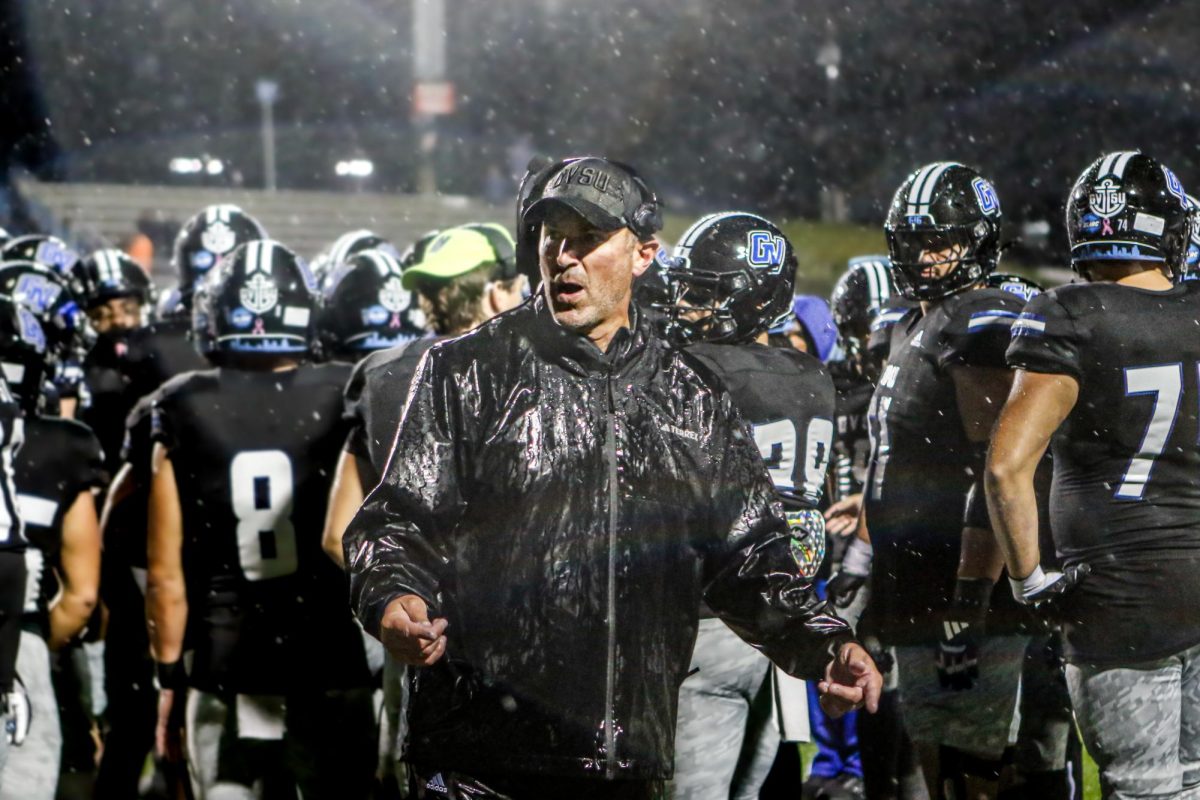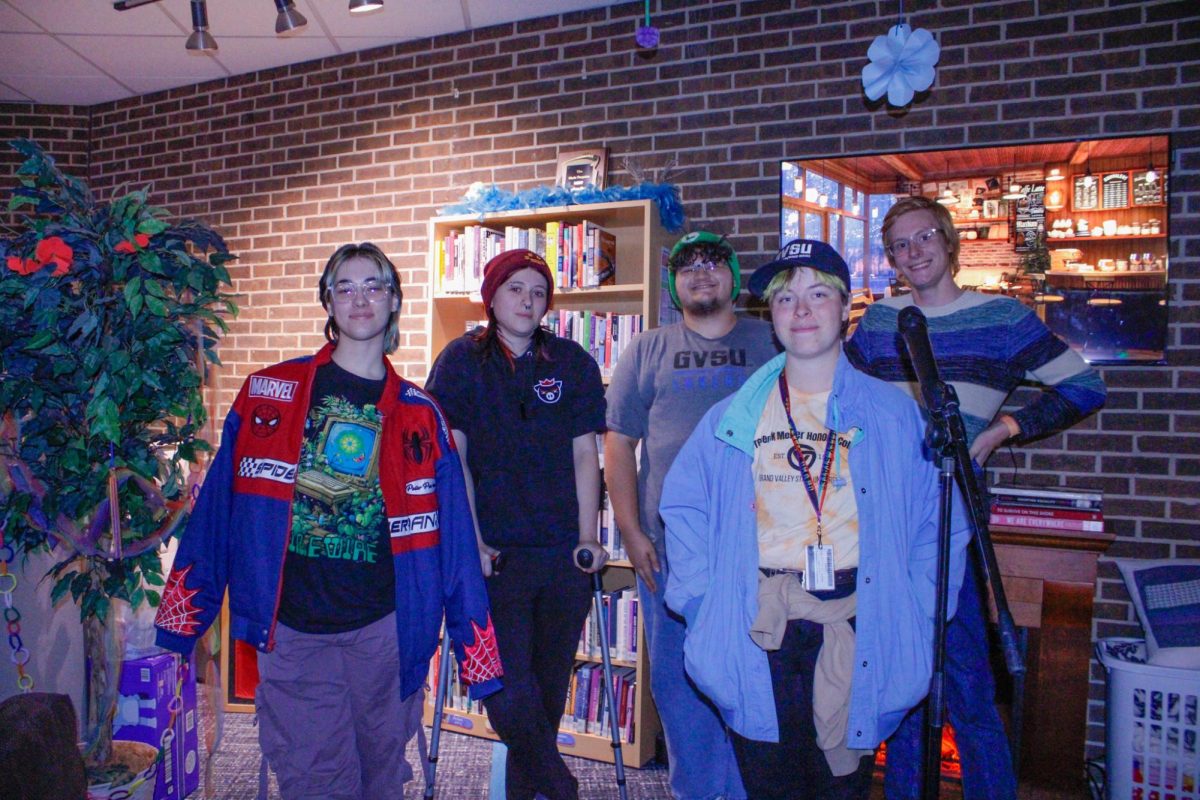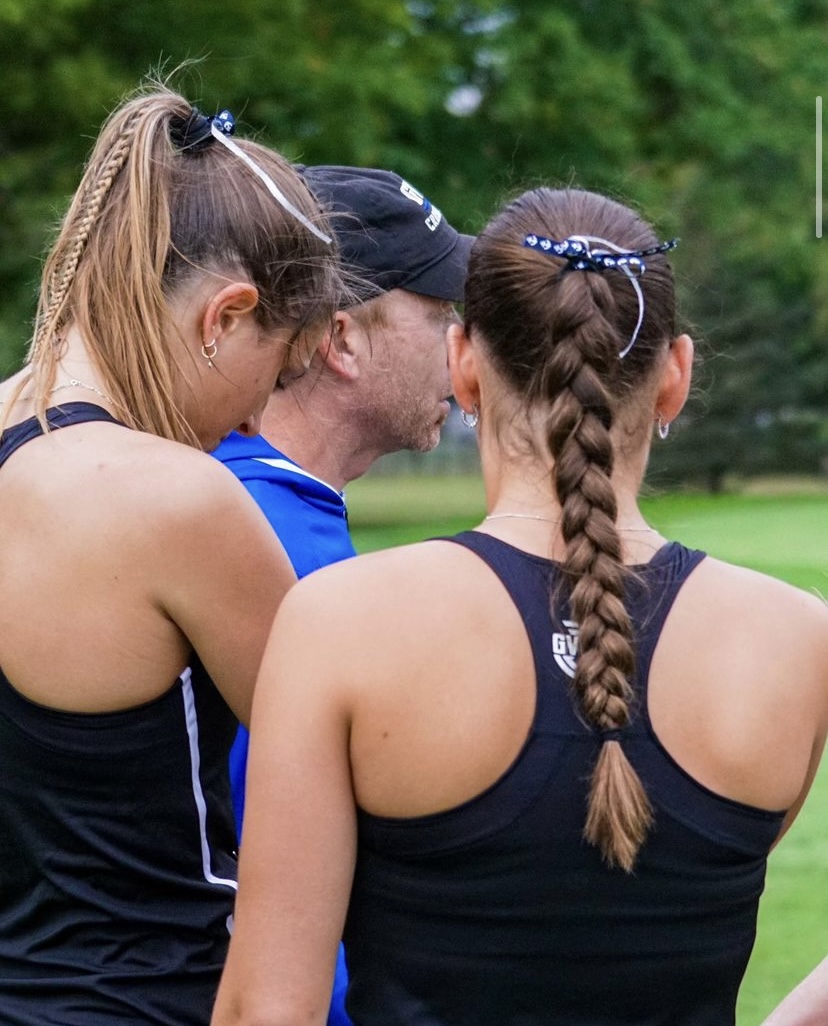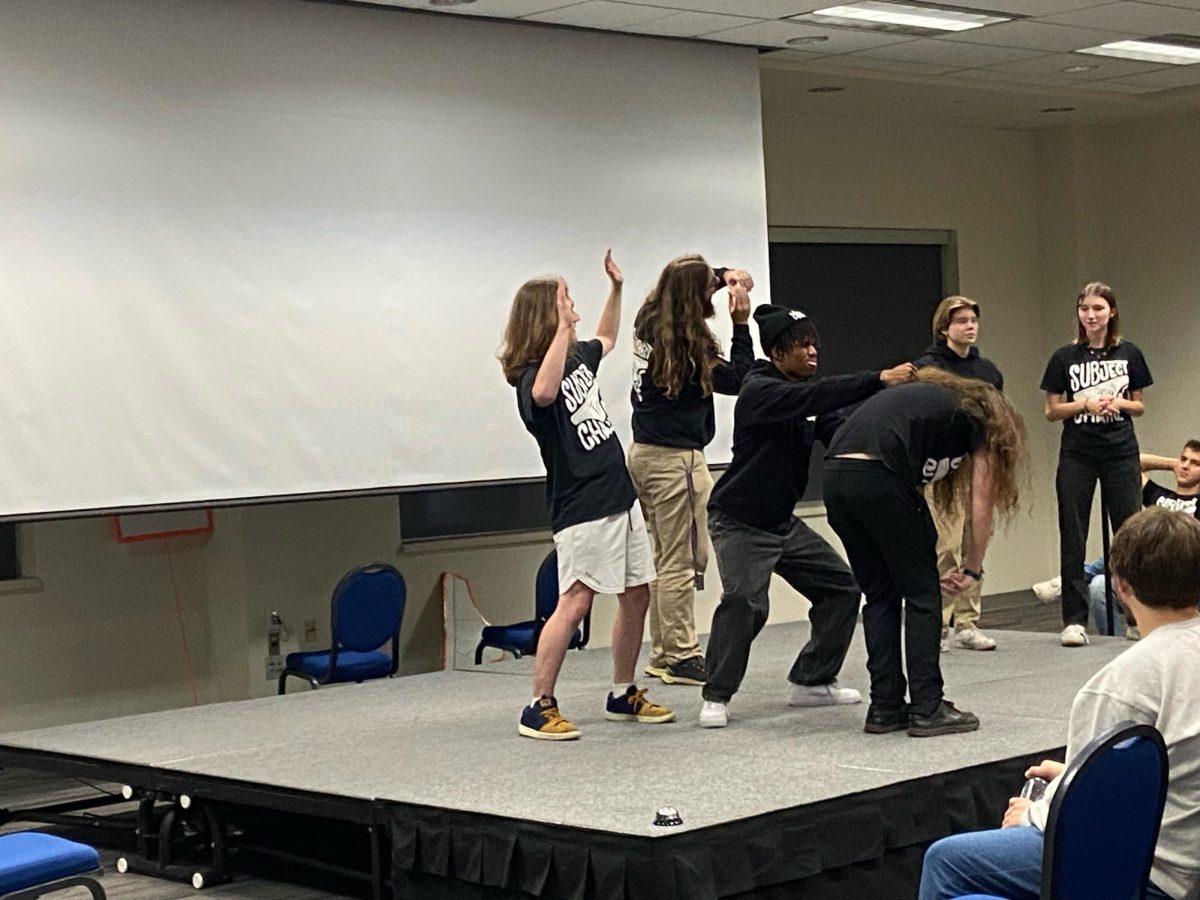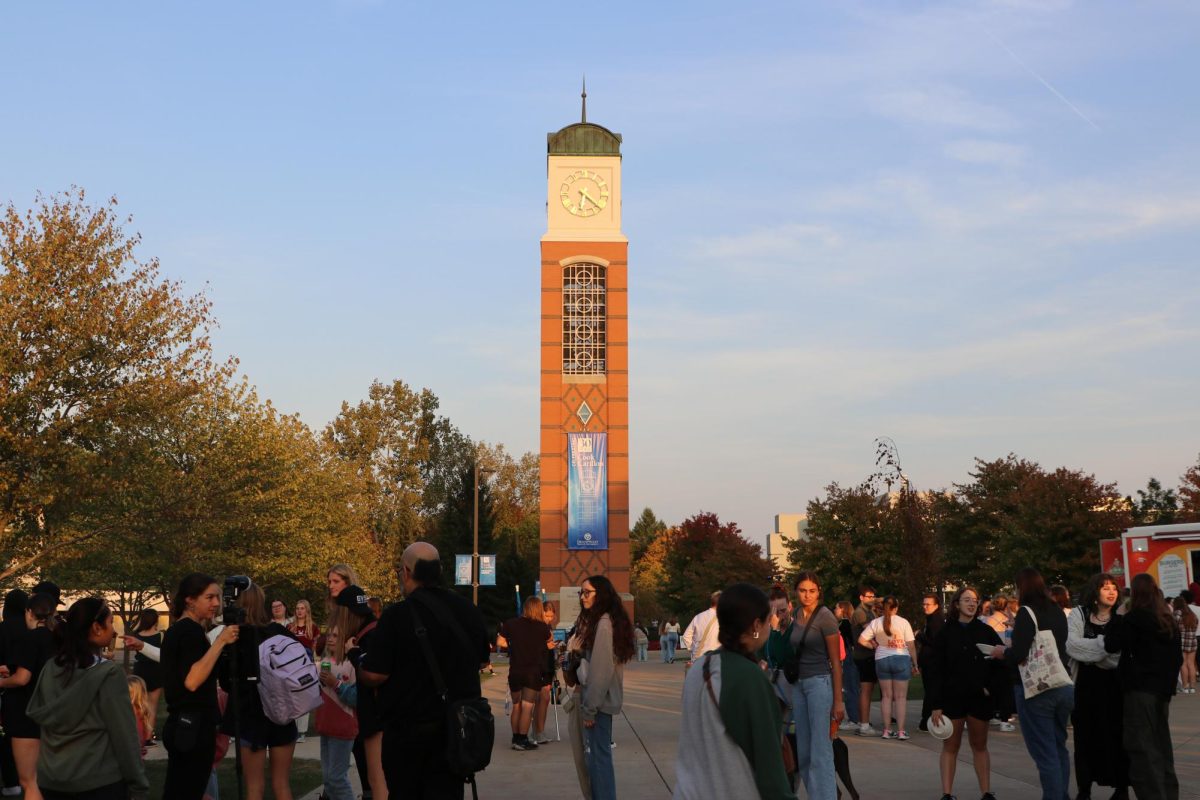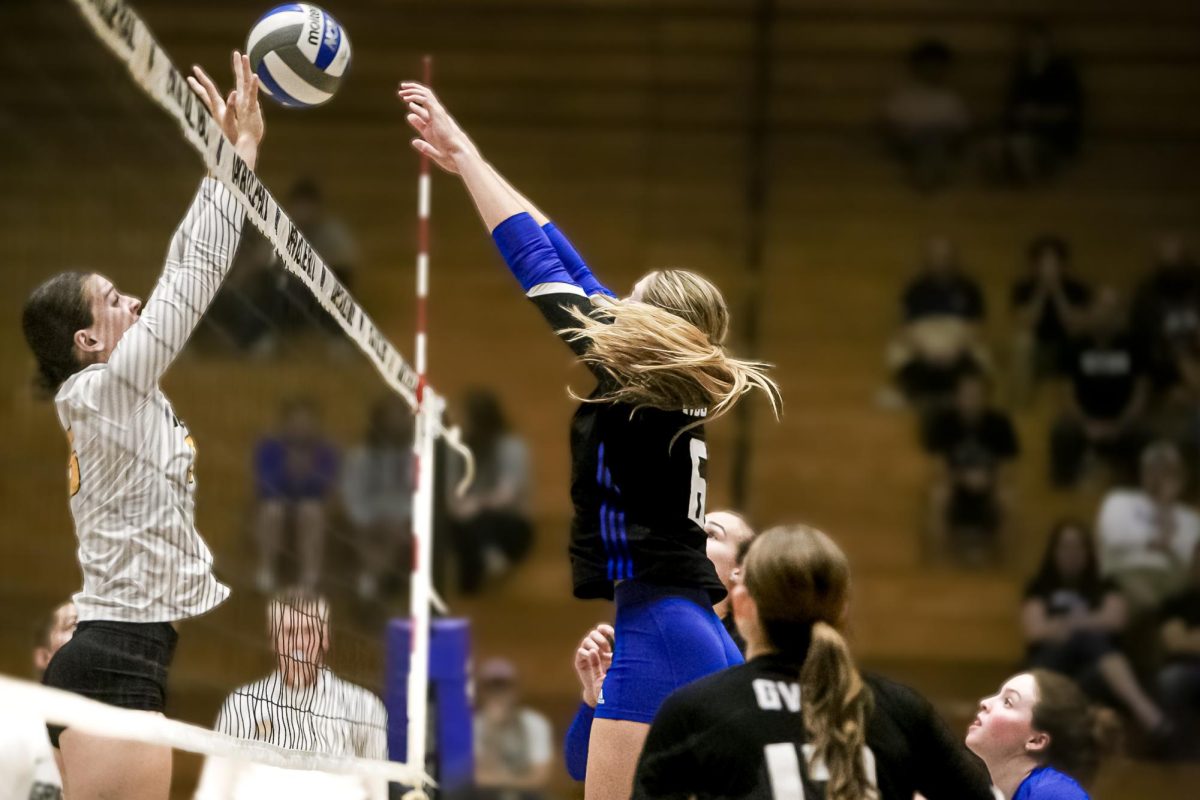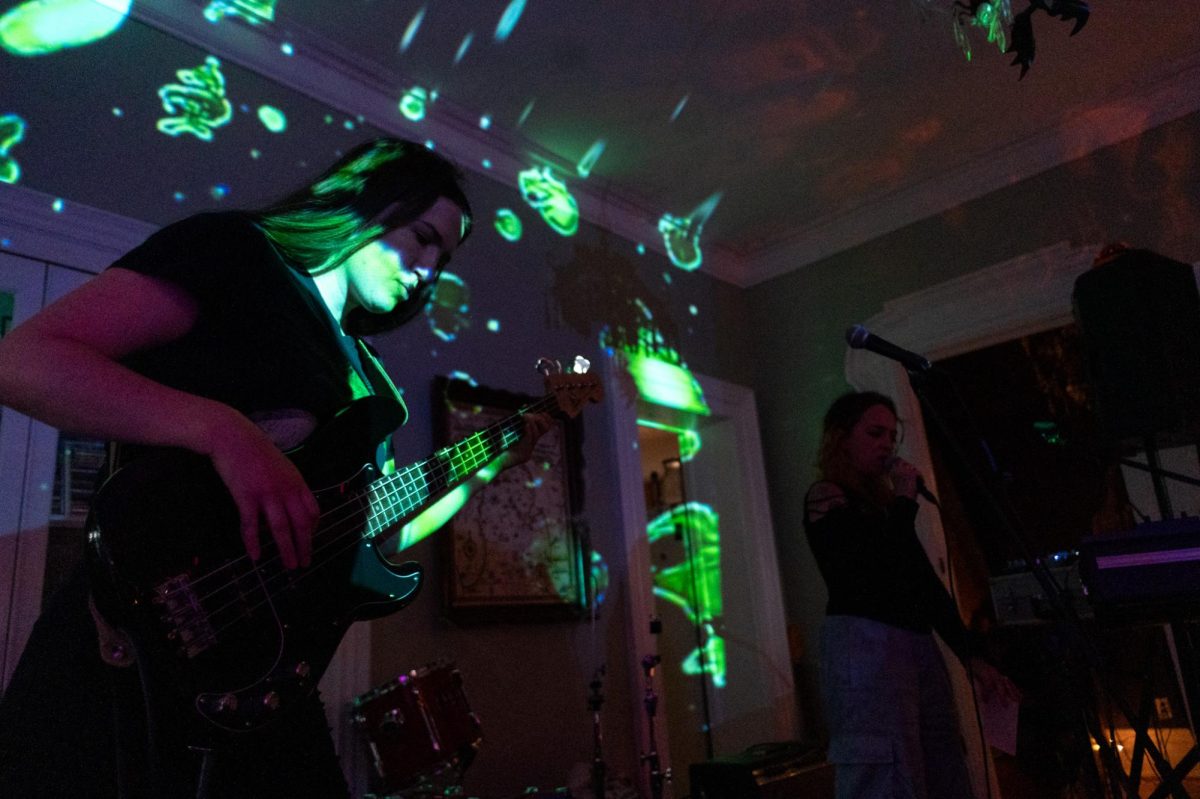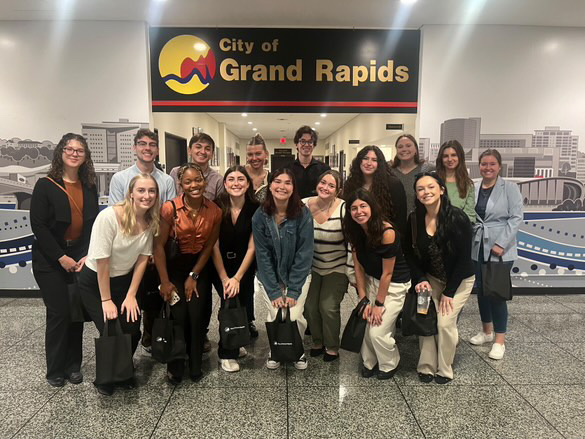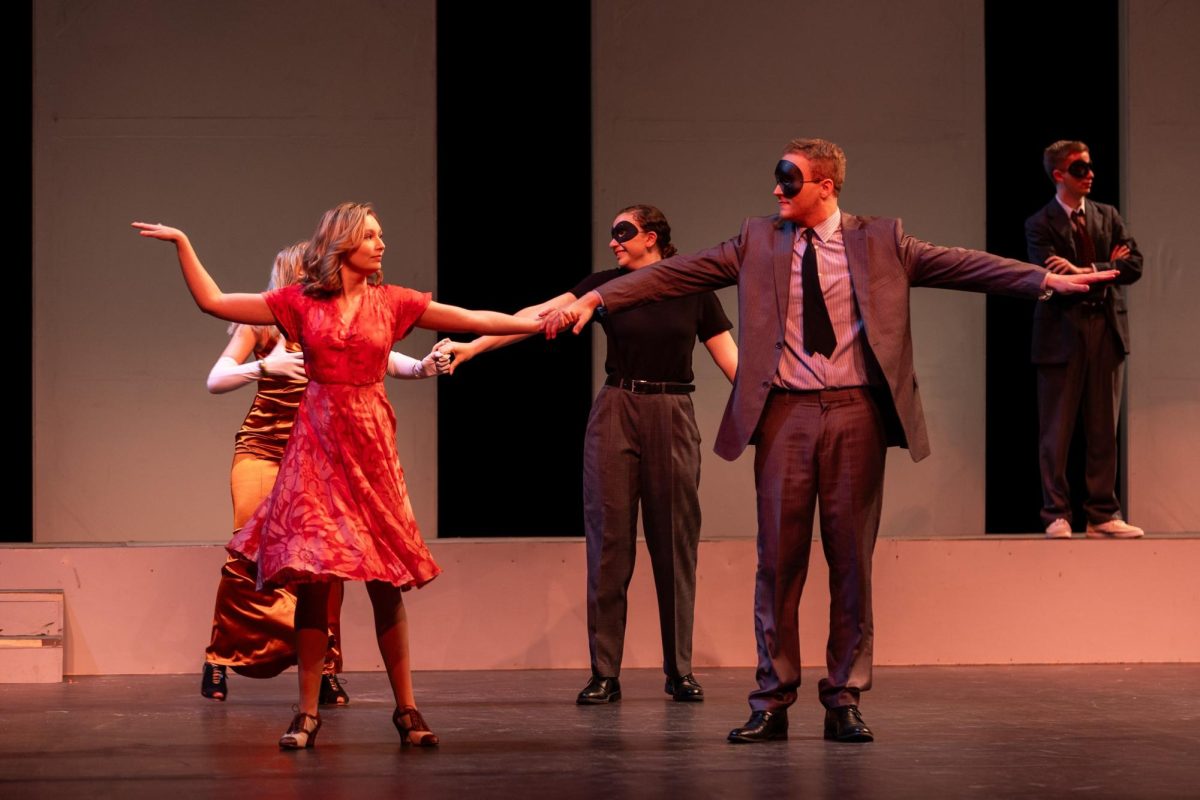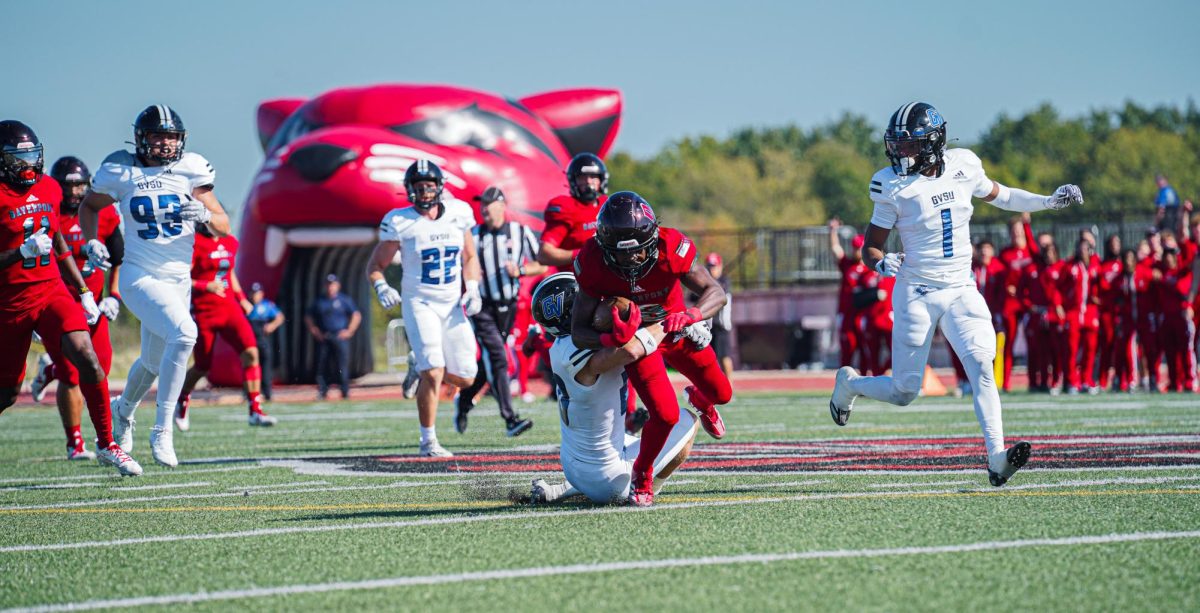GVSU heads to Shepherd in NCAA semis
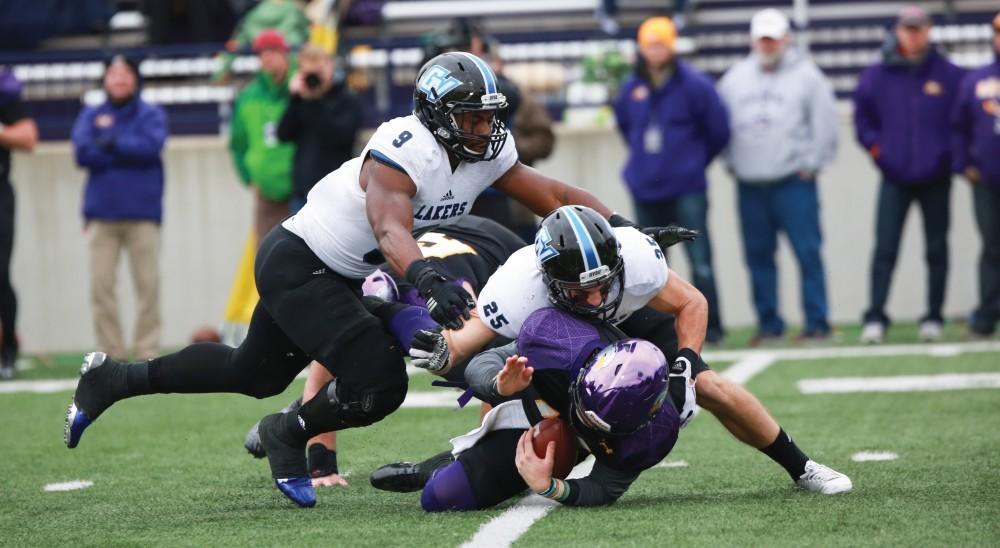
GVL / Kevin Sielaff – Garrett Pougnet (25) and Matt Judon (9) bring down Ashland’s quarterback. Grand Valley defeats Ashland with a final score of 45-28 Nov. 22 at Ashland University.
Dec 10, 2015
The Grand Valley State football team bruised, snuck and slashed its way through the Super Region 4 gauntlet, and emerged on the other side as the region champions, slated for a spot in the NCAA semifinals.
In the section of the bracket above GVSU, Shepherd University, the No. 1 seed, earned a first-round bye and battled through two low-scoring contests to meet the Lakers with a spot at the national championship on the line.
Four teams are left in Division II. Though GVSU (12-2) was the No. 6 seed in Super Region 4, the rankings have long flown out the window.
“In March Madness, the higher-seed team is the favorite. That’s wrong, not within the Division II playoff. (Rankings and seedings) are things that drive media and fans, but don’t have an indication of level of play and level of competition,” said GVSU head coach Matt Mitchell.
Though the rankings don’t mean much to either Mitchell or Shepherd head coach Monte Cater, the latter skipper believes his team to be the dark horse heading into play.
“I don’t think there’s any doubt we’ll be considered an underdog,” Cater said. “Grand Valley has been there year after year. We’ve been there twice (including 2010) and it’s great. But every year is different. Every ball-club is different. The consistency (at GVSU) is tremendous and you really have to respect that and pay homage to it.
“They’re playing their best football right now and that’s what everybody would like to be able to do.”
Last round, GVSU trounced Colorado State – Pueblo 31-7, silencing a dynamic rushing attack in the process. With a new week comes a new team. Mitchell and his staff are in the process of flipping the game plan and preparing for Shepherd’s pass-first offense, as opposed to CSU-Pueblo’s run-heavy scheme.
The Rams (12-0) are led by junior quarterback Jeff Ziemba, a Harlon Hill Trophy finalist for the top Division II player in the nation. Ziemba is one of the most efficient quarterbacks in the nation, and has completed 222 of 354 passes for 3,272 yards, 29 touchdowns and just four interceptions.
Mitchell described Ziemba as “a big kid (with a) great arm, good touch, good feel for spacing.”
While much has been made of GVSU’s depth and talent in the receiving corps, Shepherd sports its own wealth of talent in the area. 6-foot-4 junior Billy Brown leads the Shepherd wideouts in catches (74), yards (1,265) and touchdowns (7) — matching up fairly close statistically with GVSU’s Matt Williams (64 catches, 1,196 yards, 16 touchdowns).
Junior Tony Squirewell, a speedy slotman, has 44 catches for 638 yards and six touchdowns, and third option Dalton Boyd has pulled in 37 catches for 547 yards and four touchdowns.
The talented receivers will provide a test for GVSU’s young secondary, which has been highlighted on the field by ballhawking cornerback Tre Walton, who has six interceptions on the season — including two against CSU – Pueblo.
“At the end of the day the two stats I care about the most, besides the score, are the turnovers (and explosive plays),” Mitchell said. “We did not turn over the ball (against CSU – Pueblo). If we can continue to do that and force some turnovers and continue to have a big explosive play differential… I think that’s why the score was what it was.”
Shepherd, which competes in the Mountain East Conference, had faced the 54th-best schedule in the nation heading into the playoffs, according to www.ncaa.org. The Rams ripped through their conference slate, and won just one game by fewer than 17 points within the conference.
GVSU, on the flip side, faced the 19th-best schedule in the nation during the regular season. Playing in the GLIAC forced the Lakers to bring their best each week, as they lost conference games to Ferris State and Ashland prior to the playoffs.
“We’ve grown a lot throughout the course of the season,” Mitchell said. “If you’d asked me back in August or early September if we’d be in this position, I don’t know if we had a lot of confidence.”
Confidence will be key for a young Laker squad that lost starting tailback and senior Kirk Spencer to a broken left fibula in last week’s win. Freshman Martayveus Carter is expected to fill Spencer’s role as the lead back going forward. In the CSU – Pueblo game, Carter rushed for 231 yards — a GVSU playoff record.
The Lakers, which saw a number of key players miss time last game due to injury, will be banged up for the Shepherd contest, but expect the usual suspects to be able to play, with the possible exception of freshman wide receiver Nick Dodson.
Despite Cater’s assertion that GVSU has been to the semifinals “year after year,” this is just the ninth time in the program’s 35-year history the Lakers have made it this deep in the tournament. The last time the Lakers were in the semifinals was in 2013, when they fell 27-13 to Northwest Missouri State.
“When you play football at Grand Valley State, there’s an enormous amount of expectations,” Mitchell said. “I haven’t seen these guys as a team fold under that pressure at any point in time. It’s a group of guys that wants to make their mark.
“There’s not a lot of giddiness, not a lot of guys just happy to be here. I’ve seen a pretty focused crew.”
Shepherd beat Indiana (Pennsylvania) 17-13 in the second round of the playoffs after receiving a bye. The Rams then knocked off Slippery Rock 28-16 to advance to the semifinals. Saturday’s game will be Shepherd’s fourth in a row at home. GVSU, in contrast, will play away from home for the fourth week in a row and the sixth time in seven games.
“(The travel) really isn’t too bad,” said GVSU receiver Jamie Potts. “Obviously at this point we’re flying charter. It’s better than traveling on a bus for eight or nine hours, so from that standpoint it’s not too bad. The travel is kind of secondary.”
The Rams and the Lakers will butt heads starting at noon on Saturday in Shepherdstown, West Virginia.



